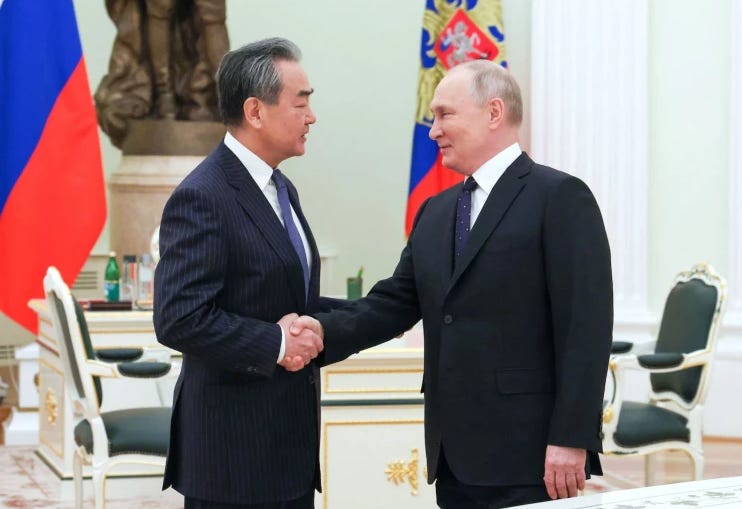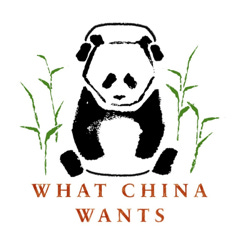The Evenstar Institute's Weekly Chinese Influence Bulletin 25 Feb 2023
China and Russia and a Ukraine peace plan, Taiwan's cables cut, China builds in Bosnia's Serb Republic, EU TikTok ban
Hello and welcome back to What China Wants.
Below we publish the weekly newsletter of the Evenstar Institute, the parent of What China Wants and a think tank dedicated to measuring and understanding national influence in the 21st century.
ABOUT THE EVENSTAR BULLETIN
The Evenstar Institute's weekly bulletin comprises updates on changing global influence, macro supply chain events, and other China-related news. We will also highlight books, articles, events, and episodes of our podcast, What China Wants.
If you have any questions about the contents of the bulletin or the Institute's research, get in touch via our website.

INFLUENCE UPDATES
Foreign Minister Wang Yi visits Russia
Government and Administration
On 22 February, China’s Foreign Minister Wang Yi met with President Vladimir Putin in Moscow, completing his European tour following earlier visits to France, Italy and Hungary. In brief televised remarks, Wang said China and Russia were ready to deepen their strategic cooperation. Putin meanwhile asserted that “Russian-Chinese relations were proceeding as planned” and talked of reaching “new milestones” in areas such as bilateral trade as well as expressing Russia’s gratitude to China. Reports have subsequently circulated that President Xi Jinping is expected to visit Putin in Russia in the coming months, although an exact date has yet to be announced.
The meeting came just two days before the first anniversary of the start of the Ukraine war. Putin described the contemporary international situation as “quite complicated” and described Sino-Russian cooperation as “important for stabilising the international situation”. In turn, Wang reportedly said “a crisis is always an opportunity” and that the Sino-Russian relationship was “never dictated by any third parties”. Following the meeting, on 24 February, Beijing's Foreign Ministry released a 12-point statement on the Ukraine war, calling for a cease fire and peace talks,
Chinese drone manufacturer reportedly negotiating supply of drones to Russia
Defence and Security
According to information obtained by Der Spiegel and published on 23 February, the Russian military is engaged in negotiations with Chinese drone manufacturer Xi’an Bingo Intelligent Aviation Technology (‘Bingo’) over the mass production of kamikaze drones for Russia. Reportedly, Bingo has agreed to manufacture and test 100 ZT-180 prototype drones, which could then be delivered to the Russian Defence Ministry by April 2023.
Bingo reportedly also plans to deliver components and know-how to Russia so that the country can produce around 100 drones per month on its own. Military experts believe the ZT-180 is capable of carrying a 35-50 kg warhead, and that the design of the unmanned aerial vehicle could be similar to that of Iran’s Shaheed 136 kamikaze drone, which has already been used by Russia in Ukraine.
Chinese vessels responsible for Taiwan submarine cable cuts
Digital Infrastructure
A preliminary investigation linked Chinese vessels to two incidents where subsea internet cables connecting Taiwan and its outlying Matsu Islands were severed. The first cable was cut due to a Chinese fishing boat on 2 February, while the second was damaged on 8 February by a cargo ship of Chinese origin. The findings were reported by major telecommunications firm Chunghwa Telecom, which operates Taiwan’s subsea cables, and have been filed with the Coast Guard Administration.
This is the second time two Taiwanese undersea cables have been down at the same time, following a similar incident in 2022. Repair vessels are not expected to arrive until 20 April at the earliest, with a cost estimated between NTD 10 million (USD 329,009) and NTD 20 million (USD 658,000). Broken cables have been reported more than 20 times between Taiwan and Matsu in the past five years. However, two breakages within six days is unusual and has led to speculation over potential deliberate action. In an article for Foreign Policy, Elisabeth Braw, a fellow at the American Enterprise Institute, suggested that it could be a dress rehearsal for the severing of Taiwan’s internet. Braw added that previous cable breaking incidents in Taiwan have mainly involved Chinese sand dredgers, which can also be interpreted as an example of grey-zone tactics.
Meanwhile, Chunghwa Telecom has downplayed the impact on internet connectivity and said it could not comment on whether foul play was involved in the latest incident.
Source: Submarine Cable Map; Taiwan News
Chinese consortium signs highway deal with Bosnia’s Serb Republic
Finance, Trade, and Investment Transport and Logistics
On 23 February, Reuters reported that a consortium of Chinese companies and the government of Bosnia’s autonomous Serb Republic signed a BAM 350 million (USD 190.5 million) deal for the construction of a section of a northern highway connecting the region with Serbia.
The consortium includes China Overseas Engineering Group Co Ltd, China Tiesiju Civil Engineering Group Co Ltd. and China Construction Bank, and will plan, build and finance the 17 km long Brcko-Bijeljina section. In the signing ceremony, the Serb Republic Prime Minister Radovan Viskovic asserted that "This is a big day for Republika Srpska”. He added that the 15-year loan will have a three-year grace period and a five-year guarantee, but declined to provide further details, saying it was up to the Chinese partners.
The significance of the highway is that it fulfils Serb Republic ambitions for a modern highway connecting most of its territory with Serbia, its political ally and largest trade partner. The republic reportedly turned to Chinese investors after the European Bank for Reconstruction and Development (EBRD) declined to support the project, which it deemed ‘not vital’.
European Commission bans TikTok on staff devices
Digital Infrastructure
Staff working at the European Commission have reportedly been ordered to remove the TikTok social media app from their phones and corporate devices. The BBC reported the new ban on 23 February and explained that it also means that European Commission staff cannot use TikTok on personal devices that have official apps installed. The Commission employs around 32,000 permanent and contract employees, who must now remove the app as soon as possible and no later than 15 March.
The Commission explained the decision as a measure to "protect data and increase cybersecurity". The measure comes as TikTok, owned by Chinese company ByteDance, faces increasing scrutiny following allegations that it harvests users’ data and provides it to the Chinese government. The US government banned TikTok on federal government-issued devices last year over national security concerns. More recently, the Dutch government reportedly advised public officials to avoid the app over similar concerns.
TikTok insists it operates no differently from other social media. In response to this latest measure, a spokesperson said “We are disappointed with this decision, which we believe to be misguided and based on fundamental misconceptions”.
OTHER NEWS
A Closer Look: China’s Global Positioning
This week China has released two position papers. The first of these relates to its stance on the Ukraine conflict, offering a Chinese solution to the war, while the second outlines a plan for world peace. Through these, Beijing is likely seeking to position itself as a global peacemaker, but its open opposition to the use of unilateral sanctions can also be interpreted as a defiant message to the US.
For further detail on how we might interpret these papers, Evenstar analysts recommend the following pieces:
EURACTIV: In this briefing EURACTIV with the AFP outline the key takeaways from the Ukraine-focussed position papers. A good starting point for a distilled brief of the detail.
BBC: Tessa Wong, the BBC’s Asia Digital Reporter examines some of the potential motivations for what she calls Beijing’s “charm offensive” over Ukraine and Russia.
Deutsche Welle Chinese Network: in this comprehensive long-read William Yang interviews two academic specialists, Zhuang Jiaying of the National University of Singapore and Blake Herzinger of the American Enterprise Institute. This digs further into the detail of the position paper and examines what China’s statement might want to convey and whether it lacks an opportunity to push Russia to change its behaviour.
What Wang Yi’s European tour told us about China-EU relations
For those interested in understanding more of the detail on Wang Yi’s diplomatic tour of Europe, we would recommend this LSE blog by Dr Filippo Boni. In this post, Dr Boni assesses what the tour told us about China’s strategy for engaging with the EU. He interprets Wang’s European tour as signalling China’s desire to regain some lost ground (and status) on the European continent, as well to convince European countries to pursue their own, largely commercial, interests as opposed to those of the United States.
In addition to this, Dr Boni draws a particular focus on the context and importance of China-Italy relations as well as China’s use of Italy’s independent news agency ANSA to convey some of its key messages. This reflects additional research he has previously conducted on China’s use of “strategic partnerships”. His October 2022 paper featuring insights from Italy is open access and available here and well worth a read.
THE PODCAST
In this week’s episode of What China Wants, Sam and Stewart discuss the issue of human rights in China. To do so, they are joined by Benedict Rogers, Co-Founder of Hong Kong Watch and one of Britain’s foremost and most knowledgeable campaigners on the subject.
We discuss some of the key issues raised in his book, The China Nexus, including allegations of human rights abuses in Hong Kong and Xinjiang, organ-harvesting from prisoners of conscience, as well as some of the criticisms commonly levelled at critics of China's human rights record.
You can also listen to the podcast on Apple, Amazon, or Spotify.
ABOUT THE EVENSTAR INSTITUTE
The Evenstar Institute is a non-partisan, not-for-profit think tank focused on measuring and understanding the evolving nature of national influence in the twenty first century.
If you would like to support us, please visit the donate page on our website.





Hi Godfree - thanks as always for your message. I'm not sure that independent analysis will back you up in your claim that "China is now the world leader in almost all fields of human endeavor". This is not an anti-China position, far from it. But you don't provide any evidence to support it.
Why not come on the show and argue your case?
Great leads. Many thanks!
Guys, have you noticed that, though you tend to select articles of high quality, they support the Western MSM point of view – of which we need no more.
Since 1942, that POV has generated policies that have been consistently wrong about China.
Instead, why not focus on why China is now the world leader in almost all fields of human endeavor and is run by the most trusted, competent government in world history.
If we can't have good government, at least tell us about someone who can and does.